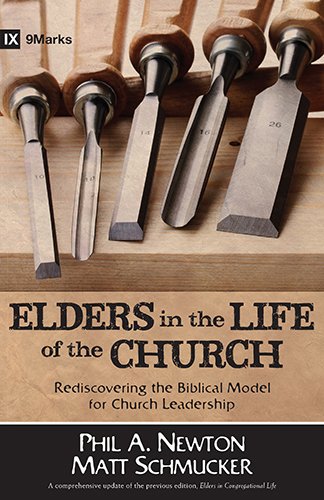Author: Phil Newton & Matt Schmucker
Publisher: Kregal Ministry
Reading Level: Moderate
Pages: 256
Elders. In some denominations the word is the standard for church leadership, in others it can be associated with false polity. Nowhere is this more the case than in the Baptist denomination with its doctrine of local autonomy. Historically, this has provided the opportunity for Baptists to live on both sides of the polity debate. But in recent years the debate over polity has increased.
In Elders in the Life of the Church: Rediscovering the Biblical Model for Church Leadership (henceforth simply Elders), Phil Newton and Matt Schmucker put forth the Biblical arguments for a church polity presided over by elders as well as compiling practical advice and application from their wealth of pastoral ministry.
The Communication
In light of this backdrop, Elders is clear that it is written for an audience of Baptist congregation and pastors. Thus it is no surprise that the great value of Elders lies in the practical advice it provides to the Baptist community. As serving pastors, both authors supply a great wealth of experience on this controversial issue.
Elders is a well communicated depiction of eldership in Baptist polity. The pace is slow with occasional repetition, but it is pastoral repetition. The necessary elements of these Biblical truths are covered both exegetically and practically, and the language of Elders is directly accessible for laymen with little to no previous knowledge on the subject. The humility of the authors in presenting their view is evident and their consistent call for pastors to gently shepherd their sheep is admirable.
The Content
Elders is presented in three distinct sections: “why,” “Biblical texts,” and “theory to practice.” The value of each of these sections can be addressed separately since the emphasis is quite different. In the first section (chapters 1-6) the common objections and responses to Baptistic thinking are presented. The chapter titles, “Why Baptist Elders Is Not an Oxymoron” (emphasis original) and “Not Actually a New Idea,” present a prima facie stance on the outlook of the book. Elder polity in the Baptist church is not a new thing (27-29, 35-36) and the introduction of dissenters is historically clear (29-31). Part of this dissention is certainly maintained by the admission that “no single text…provides all the details” (45). This demonstrates the need for a wide grasp of the pertinent Biblical texts and how they are to be applied. Apart from a mere display that Baptists indeed have supported elders in the past, a case is made based upon the responsibilities for Biblical elders (54-57). From a practical perspective the challenge drives to a final question of “What difference can elders make in church life?” (57). The answers are obvious (many!) and the purpose is clear: the church must be convicted to move to the elder model.
In the second part (chapter 7-14) lies the Biblical explanation for elders. This section consists of a chapter on specific Biblical texts (specifically Acts 20:17-31; 1 Timothy 3:1-7; Hebrews 13:17-19; 1 Peter 5:1-5) followed up with a practical outworking of some themes from the preceding chapter. Newton provides the Biblical exegesis and Schmucker the practical guidance. These chapters include important thoughts on why “plural eldership should not eliminate congregationalism” (77) and why one should view the “elder nomination process as the beginning of a ‘de facto church split’” (emphasis original) (87).
This section does lean heavily on the interchangeability of the terms elder, overseer and pastor on the basis of their verb form (94 and elsewhere throughout). This exegesis seems insufficient as this practice cannot be carried out on other verbs in the Scripture (eg. Paul being called to save does not make him a savior in 1 Cor 9:22). An excellent example is found, however, in Titus 1:5-7 that provides Biblical support for the collapsing of these terms (115).
The third section (chapters 15-21) is where the real wealth of Elders lies. Pastors in particular will find these chapters filled with insights that vary in importance and application, as differences in situation will affect the value. Chapter 17 provides an excellent section on instructing the leadership of the church, potentially one of the book’s better chapters. Chapters 18-19 provide great warnings (197) and instruction (201-208) on the necessity of elders and the practical outworking of them in a church’s polity.
The Conclusion
In summary, Elders is an outstanding book for Baptist pastors and laymen seeking to understand the issues involved in this polity discussion. For those preparing for, going through or recovering from a transition to elder polity this book could be balm for congregational wounds. Non-Baptist readers will certainly be able to find benefit from the ideas promoted in Elders but should consider something focused on their particular denomination.
Disclosure of Material Connection: I received this book free from the publisher. I was not required to write a positive review. The opinions I have expressed are my own. I am disclosing this in accordance with the Federal Trade Commission’s 16 CFR, Part 255: “Guides Concerning the Use of Endorsements and Testimonials in Advertising.”





